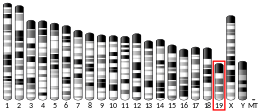Multiple inositol polyphosphate phosphatase 1 is an enzyme that in humans is encoded by the MINPP1 gene.
MINPP1 hydrolyzes the abundant metabolites inositol pentakisphosphate and inositol hexakisphosphate and, like PTEN (MIM 601728), has the ability to remove 3-phosphate from inositol phosphate substrates.
References
- ^ GRCh38: Ensembl release 89: ENSG00000107789 – Ensembl, May 2017
- ^ GRCm38: Ensembl release 89: ENSMUSG00000024896 – Ensembl, May 2017
- "Human PubMed Reference:". National Center for Biotechnology Information, U.S. National Library of Medicine.
- "Mouse PubMed Reference:". National Center for Biotechnology Information, U.S. National Library of Medicine.
- Chi H, Tiller GE, Dasouki MJ, Romano PR, Wang J, O'keefe RJ, Puzas JE, Rosier RN, Reynolds PR (May 1999). "Multiple inositol polyphosphate phosphatase: evolution as a distinct group within the histidine phosphatase family and chromosomal localization of the human and mouse genes to chromosomes 10q23 and 19". Genomics. 56 (3): 324–36. doi:10.1006/geno.1998.5736. PMID 10087200.
- ^ "Entrez Gene: MINPP1 multiple inositol polyphosphate histidine phosphatase, 1".
Further reading
- Romano PR, Wang J, O'Keefe RJ, et al. (1998). "HiPER1, a phosphatase of the endoplasmic reticulum with a role in chondrocyte maturation". J. Cell Sci. 111 (6): 803–13. doi:10.1242/jcs.111.6.803. PMID 9472008.
- Caffrey JJ, Hidaka K, Matsuda M, et al. (1999). "The human and rat forms of multiple inositol polyphosphate phosphatase: functional homology with a histidine acid phosphatase up-regulated during endochondral ossification". FEBS Lett. 442 (1): 99–104. doi:10.1016/S0014-5793(98)01636-6. PMID 9923613. S2CID 7105717.
- Chi H, Yang X, Kingsley PD, et al. (2000). "Targeted deletion of Minpp1 provides new insight into the activity of multiple inositol polyphosphate phosphatase in vivo". Mol. Cell. Biol. 20 (17): 6496–507. doi:10.1128/MCB.20.17.6496-6507.2000. PMC 86124. PMID 10938126.
- Wiemann S, Weil B, Wellenreuther R, et al. (2001). "Toward a catalog of human genes and proteins: sequencing and analysis of 500 novel complete protein coding human cDNAs". Genome Res. 11 (3): 422–35. doi:10.1101/gr.GR1547R. PMC 311072. PMID 11230166.
- Gimm O, Chi H, Dahia PL, et al. (2001). "Somatic mutation and germline variants of MINPP1, a phosphatase gene located in proximity to PTEN on 10q23.3, in follicular thyroid carcinomas". J. Clin. Endocrinol. Metab. 86 (4): 1801–5. doi:10.1210/jcem.86.4.7419. PMID 11297621.
- VanHouten JN, Asch HL, Asch BB (2001). "Cloning and characterization of ectopically expressed transcripts for the actin-binding protein MIPP in mouse mammary carcinomas". Oncogene. 20 (38): 5366–72. doi:10.1038/sj.onc.1204701. PMID 11536049. S2CID 6474518.
- Strausberg RL, Feingold EA, Grouse LH, et al. (2003). "Generation and initial analysis of more than 15,000 full-length human and mouse cDNA sequences". Proc. Natl. Acad. Sci. U.S.A. 99 (26): 16899–903. Bibcode:2002PNAS...9916899M. doi:10.1073/pnas.242603899. PMC 139241. PMID 12477932.
- Clark HF, Gurney AL, Abaya E, et al. (2003). "The secreted protein discovery initiative (SPDI), a large-scale effort to identify novel human secreted and transmembrane proteins: a bioinformatics assessment". Genome Res. 13 (10): 2265–70. doi:10.1101/gr.1293003. PMC 403697. PMID 12975309.
- Deloukas P, Earthrowl ME, Grafham DV, et al. (2004). "The DNA sequence and comparative analysis of human chromosome 10". Nature. 429 (6990): 375–81. Bibcode:2004Natur.429..375D. doi:10.1038/nature02462. PMID 15164054.
- Gerhard DS, Wagner L, Feingold EA, et al. (2004). "The status, quality, and expansion of the NIH full-length cDNA project: the Mammalian Gene Collection (MGC)". Genome Res. 14 (10B): 2121–7. doi:10.1101/gr.2596504. PMC 528928. PMID 15489334.
- Liu T, Qian WJ, Gritsenko MA, et al. (2006). "Human plasma N-glycoproteome analysis by immunoaffinity subtraction, hydrazide chemistry, and mass spectrometry". J. Proteome Res. 4 (6): 2070–80. doi:10.1021/pr0502065. PMC 1850943. PMID 16335952.
- Kimura K, Wakamatsu A, Suzuki Y, et al. (2006). "Diversification of transcriptional modulation: large-scale identification and characterization of putative alternative promoters of human genes". Genome Res. 16 (1): 55–65. doi:10.1101/gr.4039406. PMC 1356129. PMID 16344560.
This article on a gene on human chromosome 10 is a stub. You can help Misplaced Pages by expanding it. |




